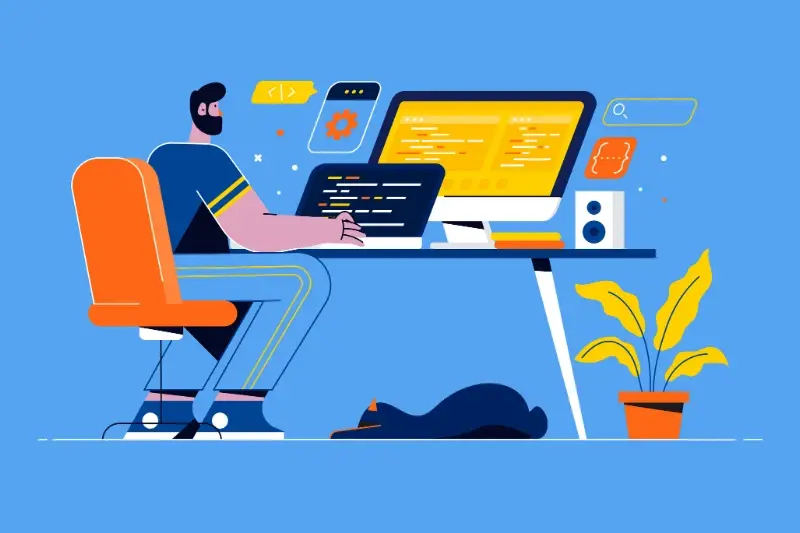How To Choose The Right App Development Partner For Your Business
Did you know that 95% of mobile apps fail within their first year? That's a huge number that should make any business owner pause before diving into app development. The difference between success and failure often comes down to one critical decision—choosing the right app development partner for your business.
I've worked with hundreds of clients over the years, and I can tell you that picking the wrong development team is like building a house on shaky foundations. Everything else crumbles from there. The good news? It doesn't have to be complicated. You just need to know what to look for.
The right development partner isn't just someone who can code—they're someone who understands your business goals and can translate them into a successful app
Whether you're a startup founder with a brilliant idea or an established business looking to expand into mobile, this guide will walk you through everything you need to know. We'll cover how to evaluate potential partners, what questions to ask, and most importantly, how to avoid the common pitfalls that trip up so many businesses. By the end, you'll have a clear roadmap for finding a development team that can turn your vision into reality.
Understanding Your App Development Needs
Before you start looking for an app development partner, you need to figure out exactly what you want to build. I know this sounds obvious, but you'd be surprised how many people come to us with a vague idea and expect us to fill in all the blanks. That's not how good app development works—it's a recipe for disappointment and budget overruns.
Define Your App's Purpose
Start with the basics: what problem does your app solve? Who will use it and why should they care? These questions might seem simple, but they're the foundation of everything that follows. If you can't explain your app's purpose in one or two sentences, you're not ready to start development yet.
Know Your Technical Requirements
Think about the features you need—not the ones that would be nice to have, but the ones you actually need. Do you need user accounts? Payment processing? GPS tracking? Push notifications? Make a list and prioritise them. This helps development partners understand the complexity of your project and give you accurate quotes. Don't worry if you're not technical; just describe what users should be able to do with your app and let the developers translate that into technical requirements. Understanding what information your app developer needs from you early on will streamline this entire process.
Types of App Development Agencies
When you start looking for an app development partner, you'll quickly discover there are loads of different types out there—and honestly, it can get confusing fast. I've worked with clients who've been overwhelmed by the sheer number of options available, so let me break this down for you.
Full-Service Digital Agencies
These are the big players who offer everything from branding and web design to app development and marketing. They're brilliant if you need a complete digital makeover, but they might not have the deep mobile expertise that specialist agencies possess. Think of them as the department stores of the digital world.
Specialist Mobile App Agencies
This is where agencies like ours fit in. We live and breathe mobile apps—nothing else. The advantage here is focused expertise; we know the mobile landscape inside out because that's all we do. The downside? You might need to work with other partners for things like web development or marketing.
You'll also come across freelancers, offshore development teams, and hybrid agencies that mix different services. Each has its place, but the key is matching their strengths to your specific needs. If you're wondering about all the different options available, our guide on who can develop your app idea breaks down each type in detail.
- Full-service agencies: Great for complete digital projects
- Mobile specialists: Deep app expertise and industry knowledge
- Freelancers: Budget-friendly for simple projects
- Offshore teams: Cost-effective but potential communication challenges
Don't just go for the cheapest option—match the agency type to your project complexity and long-term goals.
Evaluating Technical Skills and Experience
When I'm reviewing potential development partners, I always start by looking at their technical portfolio—not just the pretty screenshots, but the actual functionality and performance of their apps. You want to see apps that work smoothly, load quickly, and don't crash when you use them. Ask to download and test some of their recent work; a good agency will be proud to show off what they've built.
Platform Expertise Matters
Different agencies specialise in different areas. Some focus purely on iOS development, others on Android, and some do both. There are also agencies that build cross-platform apps using frameworks like React Native or Flutter. The key is finding an agency whose technical expertise matches your project needs. If you need a native iOS app with advanced camera features, don't choose an agency that primarily builds simple cross-platform apps.
Beyond the Surface
Look for agencies that understand backend development, API integration, and security protocols—these aren't glamorous topics but they're what make apps actually work in the real world. Ask about their experience with app store submissions, their approach to testing, and how they handle app updates. An experienced agency will have clear processes for all of these areas and won't hesitate to explain them to you. The best developers understand that there are fundamental lessons that separate good apps from great ones.
Communication and Project Management Styles
After working with dozens of app development agencies over the years, I can tell you that technical skills mean nothing if you can't actually work together. Some agencies will bombard you with daily updates and expect instant responses to every question—others might disappear for weeks and leave you wondering if they've forgotten about your project entirely!
The key is finding someone whose communication style matches yours. Do you prefer detailed weekly reports or quick daily check-ins? Some business owners love getting into the technical weeds; others just want to know if things are on track. There's no right or wrong approach, but you need to be on the same page from day one.
Project Management Tools and Processes
Ask potential partners how they handle project management. Do they use tools like Slack, Trello, or Asana? Will you have access to see progress in real-time? Some agencies have slick client portals where you can track everything—others prefer simple email updates.
The best development partnerships feel like having an extension of your own team, not like dealing with an external contractor
Pay attention to how quickly they respond during your initial conversations. If they're slow to reply when they're trying to win your business, don't expect things to improve once the contract is signed.
Budget Planning and Cost Considerations
Let's be honest—app development isn't cheap, and pretending otherwise would do you a disservice. I've seen too many businesses get halfway through a project only to realise they've underestimated costs by 50% or more. That's a conversation nobody wants to have with their board!
Most agencies price their work in one of three ways: fixed price for the entire project, time and materials (where you pay for actual hours worked), or a hybrid approach that combines both. Fixed pricing feels safer but can become problematic if your requirements change—and trust me, they usually do. Time and materials offers more flexibility but requires better budget control on your end.
What affects your development costs?
- App complexity and number of features
- Platform choice (iOS, Android, or both)
- Custom design requirements
- Third-party integrations needed
- Ongoing maintenance and updates
Don't forget about the hidden costs that catch people out. App store fees, server hosting, push notification services, analytics tools—these recurring expenses add up quickly. A good development partner will walk you through all of these upfront rather than surprising you later. Ask for a detailed breakdown and always budget for at least 20% contingency; you'll thank me later when scope changes inevitably appear. Quality agencies understand what separates stellar apps from mediocre ones and will invest in those critical details.
Checking References and Past Work
Right, so you've narrowed down your potential app development partners and now comes the detective work—checking their references and past work. This bit is absolutely critical when you select app developer options because anyone can talk a good game, but the proof is in the pudding (or in this case, the App Store!).
Start by asking for a portfolio of their recent work. Don't just look at the pretty screenshots though; download the apps and actually use them. Are they smooth? Do they crash? How's the user experience? I always tell my clients to spend at least 10 minutes with each app because that's when the cracks start to show—if there are any.
Speaking to Previous Clients
Ask for at least three client references from projects completed in the last 12 months. When you speak to these references, ask about communication, deadlines, and post-launch support. Did the agency stick to their promises? Were there any nasty surprises with costs? Most agencies worth their salt will be happy to connect you with satisfied clients. It's worth learning what the top app development companies do differently to understand what excellence looks like in this industry.
Don't be afraid to ask tough questions about what went wrong during previous projects—how an agency handles problems tells you everything about working with them.
Look beyond just the technical quality too; check if their apps are still being maintained and updated. An app that hasn't been updated in two years might look great but tells a different story about ongoing support.
Making Your Final Decision
Right, you've done all the hard work—you've evaluated technical skills, checked references, and had countless conversations with potential partners. Now comes the bit that actually keeps most business owners awake at night: making the final call. I get it, this isn't exactly choosing what to have for lunch; you're potentially committing months of your time and a significant chunk of your budget.
Trust Your Gut (But Back It Up With Facts)
Here's something I've learned after working with hundreds of clients: the numbers and technical capabilities matter, but so does how you feel about working with these people. Did they listen to your concerns? Do they seem genuinely excited about your project? Can you picture yourself having regular calls with them without wanting to hide under your desk?
Red Flags to Watch Out For
Before you sign anything, watch out for these warning signs that might save you a headache later:
- Reluctance to provide detailed project timelines or contracts
- Unusually low quotes that seem too good to be true
- Poor communication during the proposal stage
- No clear process for handling changes or feedback
- Unwillingness to discuss post-launch support
Take a step back and review everything one more time. The right partner will tick most of your boxes whilst making you feel confident about the journey ahead.
Conclusion
Choosing the right app development partner isn't something you want to rush into—and after reading through all these considerations, you're probably feeling a bit overwhelmed! That's completely normal. I've worked with hundreds of clients over the years, and the ones who take their time with this decision almost always end up happier with the final result.
The truth is, there's no perfect agency out there. Each one will have strengths and weaknesses; some might be brilliant at design but struggle with complex backend work, whilst others excel at technical challenges but need guidance on user experience. What matters most is finding the partner whose strengths align with your specific needs and whose communication style meshes well with yours.
Don't be afraid to trust your gut feeling after you've done all the research. If something feels off during those initial conversations, it probably is. The best app development partnerships feel collaborative from day one—you should feel like you're working with people who genuinely care about your project's success, not just completing another job. Take your time, ask plenty of questions, and remember that the cheapest option rarely turns out to be the best value in the long run.
Share this
Subscribe To Our Blog
You May Also Like
These Related Stories

The Business Case for Blockchain in Mobile Apps

Freelance Developer vs Agency: Which Delivers Better App Results?





